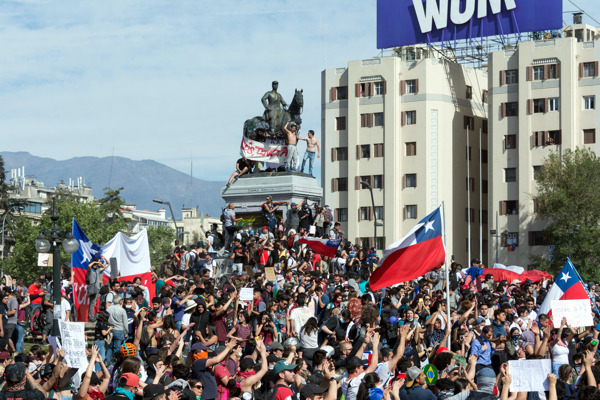Campus News
UC Santa Cruz Human Rights Lab investigates social unrest in Chile
Human Rights Investigations Labs at UCSC and UC Berkeley collaborated on open source research focused on the human rights crisis in Chile, which began with massive anti-government demonstrations a year ago that prompted a swift and sometimes brutal government crackdown on protestors.

Before she began her last year as an undergrad at UC Santa Cruz, Monica Estrada Arias had been reading voluminously about human rights issues in the United States and beyond.
While she says her mind was afire with the theoretical underpinnings of human rights across the globe, she yearned for a concrete and impactful outlet for her accumulated knowledge.
She found the opportunity to apply her theoretical knowledge at the Human Rights Investigations Lab, directed by Sylvanna Falcón, an associate professor of Latin American and Latino studies and a human rights researcher.
The Human Rights Investigations Lab at UC Santa Cruz has partnered with UC Berkeley’s Human Rights Center (HRC) to train students in the emerging field of digital verification, which uses “open-source investigation” tools and techniques to find and verify facts. Students in the Berkeley and UCSC labs learn to sift through social media postings, news media footage, satellite imagery, Google Maps and other sources available on the internet to investigate human rights abuses in the Americas and around the world. HRC opened its lab in 2016 and UC Santa Cruz established its lab in 2019.
Most recently, these two Human Rights Investigations Labs collaborated on open source research focused on the human rights crisis in Chile, which began with massive anti-government demonstrations a year ago that prompted a swift and sometimes brutal government crackdown on protestors.
“The massiveness of the protest captured the students’ imagination and their attention,” Falcón says. “There was a feeling of being a witness to history and with these new open source research skills, a deep desire to do something.”
That something was the meticulous composition of three separate reports about the mass protests that began on October 19, 2019 — the first of which is a joint UC Santa Cruz and UC Berkeley visual investigation, which provides historical context and compares and contrasts the perspective of protestors and government leaders about the underlying societal factors that led to the mass demonstration. The second report from UCSC’s Investigations Lab explores the lives and deaths of 25 people who were killed during the protests in an attempt to determine whether there was a system-wide use of violence and intimidation by Chilean authorities. And the last investigation, also from UCSC’s lab, explores the final week in the life of activist Germán Arbuto.